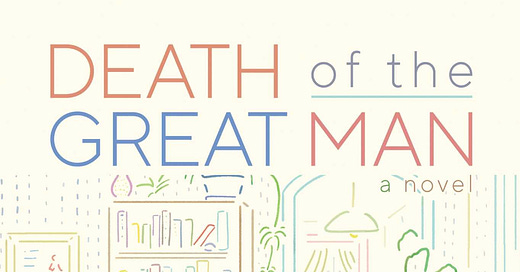‘Death of the Great Man’: a Conversation with Peter Kramer.
What would it be like to be Donald Trump's mental therapist? A renowned psychiatrist and writer gives us a fictionalized view.
After Donald Trump’s first indictment last week, several news stories told us how this “felt” from Trump’s view. Deflating, allegedly surprising, allegedly motivating to his base, purportedly equipping him for political gains.
This week a new book gives an unusual and fascinating perspective on these points. It is by Peter D. Kramer; its title is Death of the Great Man; and I think it’s worth wide attention.
Peter Kramer is known to the world as a writer and medical doctor. He’s been a practicing psychiatrist and psychotherapist, and a longtime professor at Brown. His 1993 book Listening to Prozac was a breakout success. Among his other books I’ve enjoyed and admired are Moments of Engagement, Spectacular Happiness, Should You Leave?, and more.
I have known Peter Kramer as a friend since we were teenagers and fellow writers on the college newspaper. A few weeks ago I talked with him about this latest book, officially published tomorrow. It is a roman à clef whose premise is revealed in its very first paragraph: a murder mystery about the death of a president obviously modeled on Donald Trump.
The novel is narrated by Henry Farber, who has been been the therapist and confessor of a president who is a liar, a bully, a demagogue, and in other ways recognizable. The book opens with the Great Man’s death and closes by identifying the culprit, with a lot in between.
To declare my interest, I read early proofs of the book and did a blurb for it, saying this:
Death of the Great Man is like nothing else written from our political era—in a good way. Peter Kramer’s lifetime experience as a psychiatrist, and his lifelong skill as a writer and storyteller, combine in a riveting and thought-provoking book. It is fantasy, it is reality, and it is very much worth reading.”
I won’t say much more about the book but will instead encourage you to listen to Peter Kramer discuss it here—and then read it yourself. You can hear our 34-minute conversation at the audio link below.
My thanks to Peter Kramer for writing the book and for spending the time to discuss it with me.
Questions and answers:
Here is one sample from our conversation:
Q: How did you feel you could write a book premised on the death of someone very like a real-world president? He was in office while you were doing the writing, correct?
A: Yes. Honestly I'm just slow.
I wanted this to be done while he was in office. And I was aware that this was transgressive.
I'm a political liberal, and political assassination certainly is the least liberal expedient. It deprives the people of their choice.
But I think the death and assassination are really quite different things. And as it turns out, in the book, without giving any spoilers, many of the motivations to wish the [fictive] Great Man dead are not broad and political.
They're related to personal injury, his role in the family, his role as a actor in individual people's lives…
But the deaths of presidents are part of American history. You know, it's not undiscussable. Because it happens.
A few more sample answers, for subscribers, below.




